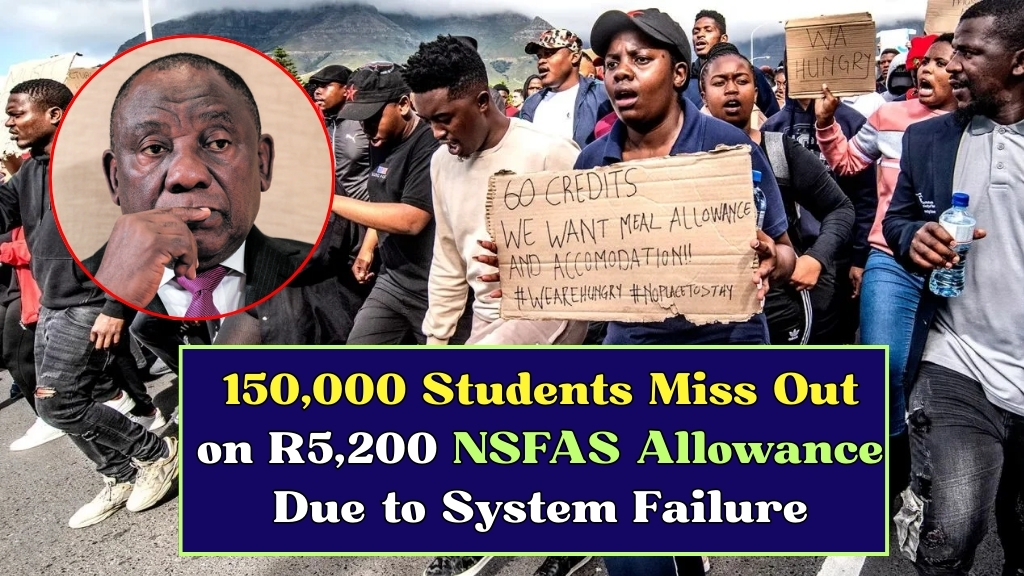NSFAS : A massive digital crash has wiped out R5,200 (£218) of essential funds that 150,000 South African learners were depending on from the National Student Financial Aid Scheme (NSFAS) this August. The mess came from a deadly glitch in a shiny, new direct payment system meant to speed money into students’ accounts. It’s now the largest payment disaster NSFAS has ever seen.
Campuses throughout the country are buzzing with reports of learners who can’t buy food, textbooks, or even bus tickets. Universities in the UK thinking about a similar digital overhaul should take the crisis to heart: new tech can hammer the very people it’s meant to keep afloat if there’s no backup plan in place.
Tech Troubles on Top of Old Worries!
Right now, the August funding mess looks like the final straw. Early findings show that the payment system crashed from too many parts falling apart all at once: servers were overworked, student records didn’t move properly, even safety locks on the system jammed. Instead of a single, easy fix, the errors piled on top of a string of smaller bugs that already had SA university leaders fuming.
Systemic Issues Kept Piling Up Till They Cracked Whole Package
March and April 2025 hosted scattered payment stalls that the system shrugged off and never finished fixing. Updates and supposed infrastructure makeovers had been flaunted at stakeholders until the service broke bad again.
Right now, the pledge sounds like static noise to 150,000 students still chasing their R5,200 mid-sized money at mid-term crunch-hour. Payment website.
Breath Fire First, Bank Account Quiet Later!
Missing this money slices way deeper than just dollars going MIA. the university counselling offices already count sponsored surge shifts filling clinics with worried looks, trembling hands and load-shedding heart rates. Residence halls letterhead start flipping eviction notices.
classrooms have rolling attendance counters skipping seats and assignments graphs redding out that the emergency babysitter gigs or bulk-shift til loading pads instead. at health centre intake desks, pharmacy scripts stack with the cruel sticky note note: change cost or double dose yet not sure. Roughly, the facing counts were never far shelf.
Staff contracting with students the length of geography already begging the future apps. now they are typing notes to money apps for emergency packs.
Click neither Here nor Next!
officials slapped a glowing headline slide of digital repair taskforce on a pro surveys the night the payment coils broke. seconds later they slapped aungt the service teams clock board.
deadline 72-hour finish. now 72 then 72 after days after declare over again, and after again. the timeline now round-house options running.
A new emergency food voucher programme rolled out at some UK universities was supposed to help as many students as possible, but it reached only about 30,000 people — a drop in the bucket compared to those still struggling.
On top of that, the emergency accommodation packets some institutions hurried to set up are too bogged down by paperwork and rules that many students cannot clear. Meanwhile, the universities have tried to plug the gaps by giving out temporary loans, meal cards, and other quick fixes.
The trouble is, none of those are big enough to tackle the crisis everyone can see tightening around even more students. The situation is a loud reminder that giving financial help through quick digital systems works only when a strong backup plan in paper and cash is also sitting at the ready.
Looking Even Further Ahead in Educational Technology
The crisis is about more than the meals that get missed; it forces schools to think through the way tech gets rolled out. Last fall, the NSFAS digital change plan bragged about fast-tracking fees and grants across South Africa, with UK schools asking to see how it worked.
Now, South African students are still waiting on back-end fixes that knock whole years of aid offline. The lesson countries are taking is to move forward — but only after stress testing, adding extra log books, and drawing up paperwork that can get students paid even when power and Wi-Fi are out.
The 150,000 South African students already waiting for their R5,200 grants have learned hard lessons that, for them, come too late. Yet, their story echoes beyond borders, carrying warnings that could keep crisis from hitting teenagers in other nations.
By watching the tangled applications and the tiresome delays, future scholars everywhere might spot warning signs sooner, alert their leaders, and make sure help arrives on time. Missing a single dose of support shouldn’t derail a year of hard work—or a lifetime of dreams.
